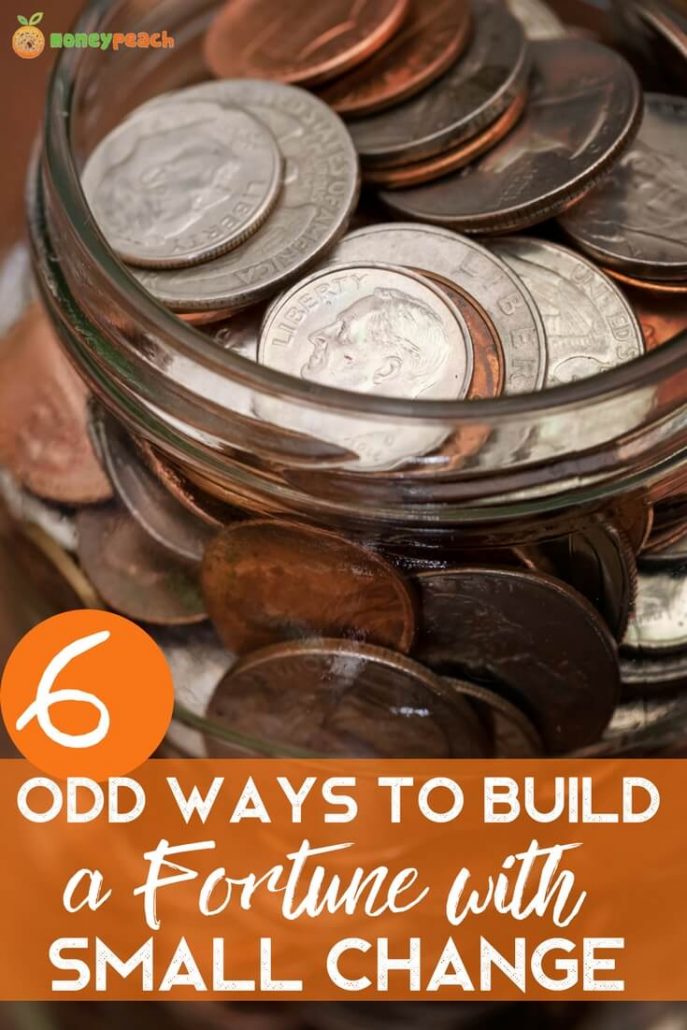What are two things you walk out of the coffee shop with after you pay with cash?
Coffee and small change.
If you are like most people, that loose change will be used for future purchases at the coffee shop or local convenience store. Instead of spending your change on your next cup of coffee, you can save your money instead.
These are a few odd ways you can build a fortune with small change!
The Millionaire Janitor
Ronald Read recently made national headlines for passing away with $8 million. Many Americans leave a multi-millionaire dollar inheritance, but, how Mr. Read accumulated his wealth is quite unique. He was a janitor and gas station attendant his entire life. These are two careers that produce very few millionaires.
While we don’t know the exact steps he took to reach $8 million, we know he was a diligent saver despite having a small salary. To reach a net worth of $8 million yourself, experts estimate you need to invest $300 a month with an 8% rate of return for 65 years.
If you don’t think you can build a small fortune from spare change think again. The money can even be sitting immediately underneath your nose and you don’t even have to make any drastic spending changes, regardless of your job or income.
1. Use a Piggy Bank
Instead of placing the loose coins in the cup holder or the dollar bills in your wallet, put the money in a piggy bank, glass jar, or coffee can. When your container is full, deposit the coins in your savings account at the bank to earn interest or invest your “profits.”
By knowing you have two dollar bills in your wallet, you know that you have enough money to buy the cup of coffee that costs $1.19 after tax. When you keep the money out of sight, you remove the temptation to make those small purchases.
Why not just make change with a $10 or $20 bill instead? If you do, put any $1 bills in your piggy bank in addition to any pennies, nickels, dimes, or quarters you receive. To make this task feel less legalistic, create a savings goal. Some ideas can be the extra change can be for your child’s college fund, extra loan payments and investment contributions, or paying for your entire family vacation.
If you are serious about saving your small change, keep only keep $10 and $20 bills in your wallet. That means anything $5 or less goes into your money jar.
2. Use a Micro-Saving App
This odd way is the digital version of the first suggestion. Using apps like Digit or Acorns can make recurring small withdrawals based on your spending habits. Digit puts the spare change into an interest-bearing savings account and Acorns places your money into a micro-investing account. Both apps allow you to make money while you sleep.
Acorns, for example, rounds up your purchase amount to the nearest dollar and invests the difference. If you spend $3.30, Acorns will withdraw 70-cents to invest and your bank account will show a $4 transaction. The amounts Digit and Acorns withdraw are so small that you will hardly realize the money is gone. You can also schedule one-time transfers to build your account balance too.
3. Schedule Automatic Bank Transfers
With each paycheck, schedule an automatic transfer. Just like your employer withholds your income taxes, 401(k) contributions, and insurance premiums every check, have your bank transfer at least $50 every check.
If you get paid twice a month and want to match Mr. Read’s investment goal of $300, you would schedule two transfers of $150 to a “no-touch” savings account or your investment account on the days your paycheck is deposited.
 4. Pack a Lunch and Save the Difference
4. Pack a Lunch and Save the Difference
If you buy your lunch every day you work, you can spend $2,500 a year if lunch costs $10 a day for 50 weeks. After working 30 years, that is $75,000 in paid lunches. Instead, pack a lunch for a fraction of the cost and place the cost savings in a separate account that earns interest.
At the end of each month, tally up the number of days you packed a lunch and transfer the savings amount to the separate account. Twenty working days a month at $10 per lunch equals $200 saved a month.
You are already in the habit of spending that money each day so it shouldn’t affect your monthly budget. Save the money for a particular goal or keep it for a rainy day. And, this tactic can be used for your other daily habits, like the gas money saved by carpooling or riding your bike to work.
5. Work a Side Hustle
Instead of coming home and watching a rerun of Friends for the umpteenth time, make some extra money in your free time with a side hustle. Perhaps you have a hobby that can be monetized like woodworking, walking dogs, designing websites, or one of these 68 side hustle ideas.
You don’t have to do a side hustle permanently and it can even be a few nights a week. Use the extra cash to pay down debts or reach a particular savings goal like maxing out your Roth IRA.
6. Shop with Ebates
When you shop online with Ebates, you can get cash back at over 2,000 online stores. This is a digital version of couponing and it only takes a single mouse click to open a shopping session and save 1% to 40% on your purchase, especially if you install their browser extension.
Quarterly, Ebates will pay you your cash rewards by mailing a “Big Fat Check” or via PayPal. Put that money into a savings account instead of your checking account to go on a mini-shopping spree.
If you are an extreme saver when shopping, you can save the difference with the other methods you use to save money at the cash register.
Summary
Anybody can build a small fortune by making a small adjustment in how they spend their money and time. While you can also build your net worth by not spending at all, it can also be possible to add an entirely new perspective on how you view spare change you receiving in your normal, everyday activities.






3 Comments
We currently throw our spare change into a “rainy day fund” jar for the random dinner out, small splurge or other purchase. Its amazing how quickly it can add up!
Yes! Change can add up quickly!
I always get cashback I ask for five-dollar bills. I have a place where I put half of the cashback, the rest I keep in my wallet and use for small purchases. and put change in a change jar. Hint old medicine bottles are great to keep spare change or emergency money In, and they don’t take up lots of room.